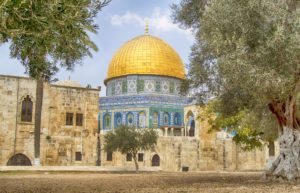
Share this Blog
Share
The Piety of Abu Bakr As-Siddīq
The Piety of Abu Bakr As-Siddīq
Hiding In The Cave
In the verse, by citing the event of the Hijrah of the Holy Prophet (SAW), it has been stressed that the Rasul of Allah has no need to depend on any human help and support. Allah can help him directly through unseen factors as it happened at the time of Hijrah when his own people had forced him to leave his homeland. On this journey, the only companion he had was Sayyidnā Abū Bakr (RA), the true one. Enemy foot soldiers and riders were looking for them in hot pursuit. The place to hide he had found was no fortified fortress. It was just a cave and the enemy search party had reached close to its edges. Inside it, the companion of the cave, Sayyidna Abu Bakr (RA) also, was worried, not for his own safety, but about his master. He was in fear lest the enemy outside were to harm the Holy Prophet (SAW) But, the master himself was sitting calm like a mountain at peace. Not simply that he was himself cool and collected, he was telling his companion, Sayyidna Abu Bakr: لَا تَحْزَنْ إِنَّ ٱللَّهَ مَعَنَا (lā taħzan innallāha ma‘ana: Do not grieve. Allah is with us).As-Siddeeq
As-Siddeeq, the most well-known of Abu Bakr’s titles, comes from the word Sidą, which means truthfulness. The word As-Siddeeq is meant to convey a meaning of intensiveness: a person who is constantly truthful or who constantly believes in the truthfulness of something or someone (in Abu Bakr’s case, in the truthfulness of the Prophet). The title As-Siddeeq’ was given to Abu Bakr this by none other than the Prophet (SAW) Anas narrated, “The Prophet (ﷺ) once climbed the mountain of Uhud with Abu Bakr, `Umar and `Uthman. The mountain shook with them. The Prophet (ﷺ) said (to the mountain), “Be firm, O Uhud! For on you there are no more than a Prophet, a Siddiq and two martyrs (‘Umar and ‘Uthmān).” [Sahih al-Bukhari 3675]His Islam
The Prophet’s (SAW) Companions were informed that, whenever he invited a person to Islam, that person would hesitate before making up his mind to embrace Islam – except for Abu Bakr (RA), who neither hesitated nor wavered, but instead immediately embraced Islam and believed in the Messenger of Allah (SAW). This should not come as a surprise to those who are familiar with Abu Bakr’s life prior to the advent of Islam: Just as the Prophet (SAW) was being prepared for the first 40 years of his life for the duties of Prophethood, so too was Abu Bakr being prepared for the first 38 years of his life for Islam and for becoming a Companion of the Messenger of Allah . Another incident attests to this reality: During one of his journeys to Ash-Sham, Abu Bakr met a monk named Buhairah, whom he wanted to consult regarding a dream he had seen. Buhairah asked, “Where are you from?” Abu Bakr (RA) replied, “From Makkah.” Buhairah then asked him which tribe he was from, and Abu Bakr (RA) replied, “From the Quraish.” Buhairah asked, “What is it that you do?” Abu Bakr answered, “I am a businessman.” Then, having listened to Abu Bakr as he related to him his dream, Buhairah said, “If Allah makes your dream come true, a Prophet will be sent from among your people; you will be his minister during his lifetime, and his Khaleefah (successor) after his death.” Abu Bakr then kept Buhairah’s interpretation a secret, which he shared with no one.YOUR WEEKLY DOSE OF
Share this Blog
Tuition Payment by Etransfer
Please send your etrasnfer in the full amount of your course tuition to
finances@ihsan.ca
IMPORTANT: The full name and email address you used to register for the course must be added as a note to the etrasnfer to assure the payment is applied to your account.